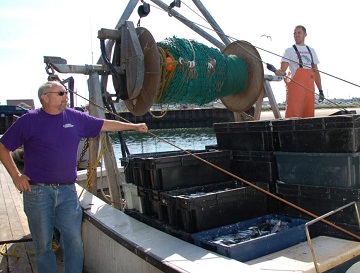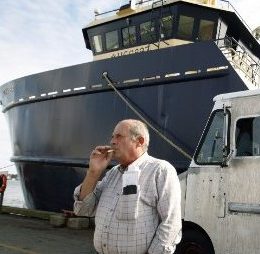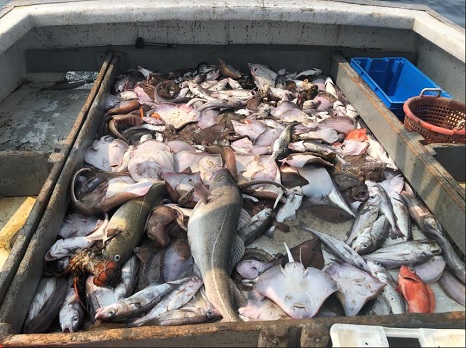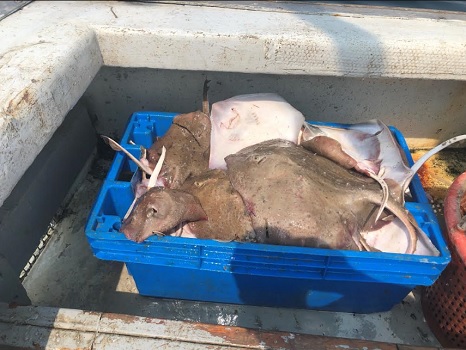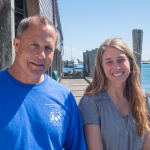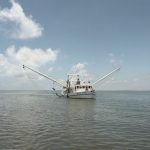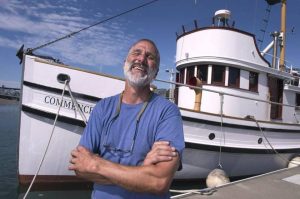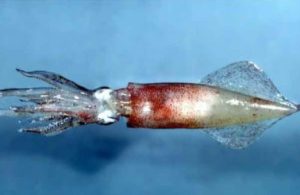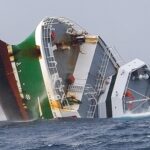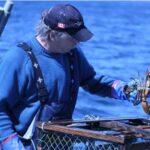Tag Archives: David Goethel
David and Ellen Goethel talk with Roger Wood About Their Favorite Subjects
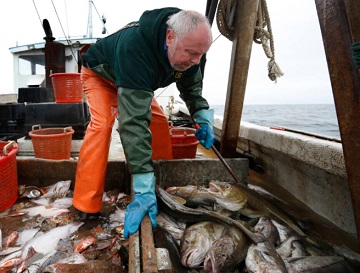 David Goethel of Hampton may have retired from commercial fishing, but he’s still on the water on a regular basis. Ellen Goethel, his wife and partner can’t stop teaching about and researching the ocean and its creatures. Together they form a formidable duo in life and in science. David survived a bout with cancer, and while recovering wrote a book. Endangered Species is about his life on the water, his favorite place. But it’s also about the losing battle that those who still go down to the sea in ships have been facing when the rules go against them at a time when scientists are declaring that overfishing has put the species at risk, especially in the productive Gulf of Maine. In this podcast, Roger Wood speaks to both of them, learning about David’s newly published book and their shared passion, the sea. >>click to read/listen<< 08:17
David Goethel of Hampton may have retired from commercial fishing, but he’s still on the water on a regular basis. Ellen Goethel, his wife and partner can’t stop teaching about and researching the ocean and its creatures. Together they form a formidable duo in life and in science. David survived a bout with cancer, and while recovering wrote a book. Endangered Species is about his life on the water, his favorite place. But it’s also about the losing battle that those who still go down to the sea in ships have been facing when the rules go against them at a time when scientists are declaring that overfishing has put the species at risk, especially in the productive Gulf of Maine. In this podcast, Roger Wood speaks to both of them, learning about David’s newly published book and their shared passion, the sea. >>click to read/listen<< 08:17
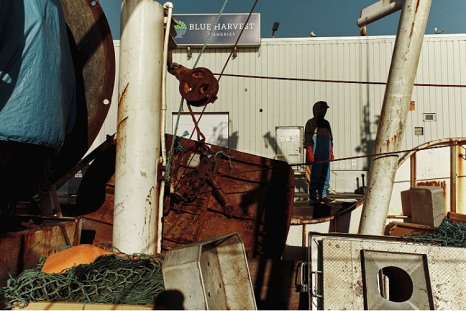
Senators Demand Federal Scrutiny of Private Equity’s Incursion Into Fishing
Three U.S. senators, including two members of a Senate subcommittee that oversees the fishing industry, are calling for greater federal scrutiny of private equity’s incursion into East Coast commercial fishing. The ProPublica/New Bedford Light investigation found that a federal regulatory system known as “catch shares,” which was adopted in 2010 to reduce overfishing, has fostered private equity’s consolidation of the industry at the expense of independent fishermen. The single largest permit holder in the New England groundfish industry is Blue Harvest Fisheries, which has rights to catch 12% of groundfish, approaching the antitrust cap of 15.5%. The current antitrust cap “fails to prevent excessive consolidation in the fishery,” said Geoff Smith, one of 18 members of the New England Fishery Management Council, which advises NOAA. >click to read< 10:23
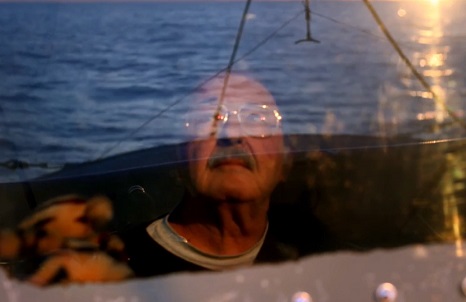
The Fisherman is the Ultimate American Hero – Fish and Men
A decade ago, while living in coastal New Hampshire, Darby Duffin had a conversation with the wife of a local fisherman. That conversation “hit me in the gut,” he said, and it haunted him for the next two years.,, “It stuck with me because it struck me emotionally,” he said. “It made me stop and think of the fishing community and the families that are involved because we don’t hear about them. Duffin took a closer look into local fishing communities, something he called “this iconic American trade so intrinsic to the cultural and economic vitality of the region” and discovered it had “devolved into a slow, quiet death spiral.” Worse, its demise seemed to be going unnoticed. Video, >click to read< 08:50
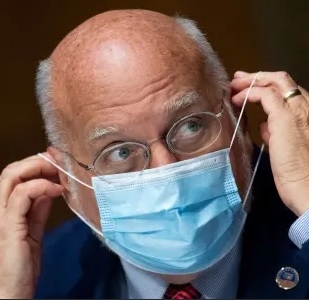
U.S. Commercial fishermen are frustrated by mask mandates from Maine to Alaska
Commercial fishing crews must be masked at all times, regardless of the number of people. The requirement stems from a Centers for Disease Control and Prevention rule issued in February saying all those on public transportation must be masked. The Coast Guard interpreted the rule to apply to all vessels, including commercial fisherman who sometimes work with crews of just three to five people. There are around 39,000 commercial fishermen in the United States. In a hearing with top administration health officials yesterday, Sens. Lisa Murkowski (R-Alaska) and Maggie Hassan (D-N.H.) brought this up. saying they’ve heard deep frustration from fishermen who argue that wearing a mask while doing their work is unsafe. >click to read< 12:43
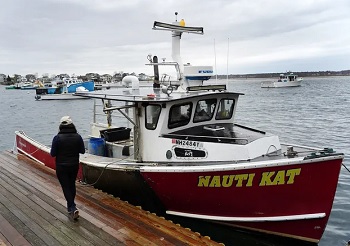
Fishing community grieves the loss of a Hampton lobsterman
Juan Peralta-Martinez became a lobsterman at a time when many say the industry was struggling to stay afloat, but those who worked alongside him said he was born for a life at sea. “He was meant to be one of the lobstermen,” said Linda Hunt, manager of Yankee Fishermen’s Cooperative,,, A husband and father of two from Hampton, Juan died at age 36 years Monday from what authorities believe was a drowning while working on his boat in the harbor. He left behind a wife and two sons, 9-year-old Juan Gabriel and 8-year-old Alejandro. >click to read< 07:48

Energy policy plan first, then offshore wind if needed – Offshore wind project needs to be vetted in NH
Here are two offshore wind farm opinion pieces in the media written by New Hampshire fisherman David Goethel. Energy policy plan first, then offshore wind if needed – With the presidential primary and annual town meetings in the rearview mirror, Seacoast residents can set their sights on the next big public policy debate. A massive wind energy facility often referred to as wind farms may be built off the coast of New Hampshire and residents will have to carefully weigh the pros and cons of this undertaking. From previous articles in Seacoast papers, it is obvious that both the political structure and the public have very little understanding of the facts surrounding this construction. >click to read< Offshore wind project needs to be vetted in NH – If you read last week’s column, you know I called on Congress to task the National Academy of Science with producing a comprehensive energy policy. One question they would answer would be why we need to construct a wind energy facility off New Hampshire when Hydro-Quebec has an enormous surplus of renewable energy going unused because no transmission line has been built to New England. Readers should ask politicians and environmentalists the same question. Meanwhile here are some facts about what is proposed for our shores. >click to read< 19:57
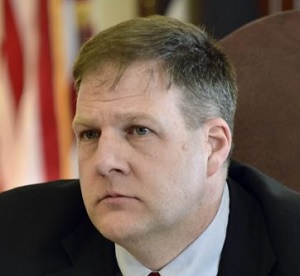
Former state rep calls on local officials to denounce offshore wind turbines in the Gulf of Maine
Gov. Chris Sununu has said the proposal has “tremendous potential.” Some local officials, like in Seabrook, have expressed concerns about their impact on wildlife, the fishing community and overall impact on Seacoast towns. Others in Hampton who oppose the wind turbines include commercial fisherman David Goethel, who fears the turbines will make it harder for the already struggling fishing industry to stay afloat. He said he is optimistic opponents of the turbines will have their voices heard. >click to read< 09:19
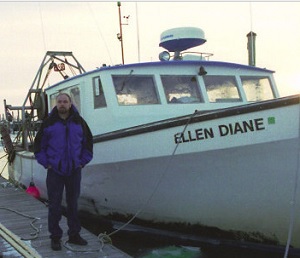
Your View: Turning fishery into police state won’t stop fraudsters like Carlos Rafael
First, I want to point out that none of this is to defend Carlos Rafael. The nicest thing he ever said about honest, small boat fishermen like me was to compare us to mosquitoes to his elephant. (“The maggots screaming on the sidelines, they’re done. They can scream all they want. Nobody can save them,”>click to read<) I do, however, think this case has one notable shortcoming in that the New York dealer who delivered his “bags of jingles” was never charged. Why? Maybe it is because enforcement used a crooked dealer as its star witness,,, by David Goethel >click to read< 22:23

David Goethel dropped us a note, and we thought we’d share it with you!
I saw your recently posted article about Carlos and Bullard’s ridiculous statement. Rafael’s own fishery complaints opened door to his downfall. Coast Guard report details extensive fishing violations (click to read) I went to that meeting driving 7 hours through a blinding snowstorm to speak for three minutes under public comment with the attached statement. I asked on the record why the corrupt fish dealer in NY was not arrested. I believe you are the only person who mentioned my comment.,,, This whole thing is a very carefully choreographed ballet to get cameras, not catch crooks. >click to read<, and please leave a comment at the bottom. Thank you.18:31
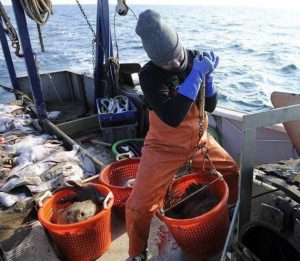
‘There’s no margin’ – Monitors final nail in coffin Feds propose up to 100% fish-counting, unclear on who’s on hook for costs
Groundfishermen, speaking Wednesday afternoon during the public comment period, drew a straight line from the increased monitoring costs to the economic collapse of the fishery. “I made 124 trips last year and each day was 10-14 hours,” said Gloucester fisherman Joe Orlando. “At $700 a day for 100% monitoring, that comes to $84,000 for the year. I didn’t even come close to making that. It would completely bankrupt the sector. And there’s only a handful of us left.” >click to read< 19:45
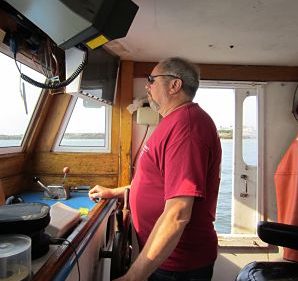
100% fishing monitoring is unnecessary, David Goethel
I would like to correct some misconceptions and rebut some of the statements made by Ms. Johanna Thomas in her Aug. 2, 2019 opinion, Monitoring will help improve New England’s fisheries. >click to read< Ms. Thomas sites the West coast Groundfish fleet as a success story. That is not the case as told by the fishermen on the West coast. She also fails to mention that 50% of the fleet was bought out in a $60 million-plus dollar buy out prior to the implementation of catch shares. This alone should have rebuilt stocks. >click to read< 21:28
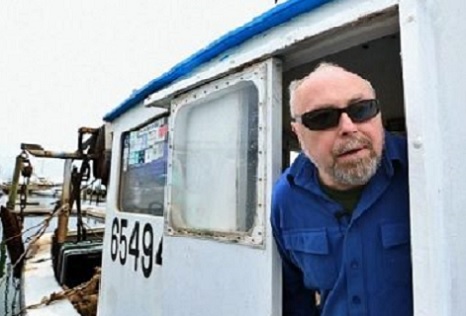
UPDATED: The hidden cost of fishery monitoring
Recently my crewman came into the wheelhouse with a complaint. I am a commercial fisherman and we were on our third consecutive day of carrying at-sea monitors, which we are required to do in 2019 on at least 31% of trips. This is like having your own state policeman ride with you to work to make sure you do not exceed the speed limit. They watch you to make sure you do not throw over any fish that are part of your quota. Because the government wants their monies worth, they have them weigh everything you bring on board. By David Goethel >click to read< 18:41 Dave sent these photo’s which were not included in the article.
100% fishing monitoring is unnecessary, David Goethel
August 13, 2019
I would like to correct some misconceptions and rebut some of the statements made by Ms. Johanna Thomas in her Aug. 2, 2019 opinion, Monitoring will help improve New England’s fisheries. >click to read< Ms. Thomas sites the West coast Groundfish fleet as a success story. That is not the case as told by the fishermen on the West coast. She also fails to mention that 50% of the fleet was bought out in a $60 million-plus dollar buy out prior to the implementation of catch shares. This alone should have rebuilt stocks. >click to read< 21:28
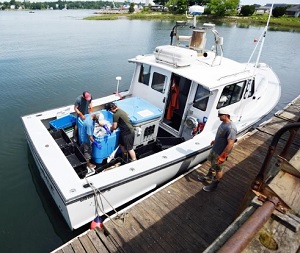
Catching fish is the easy part, Quota system? Not so much
The Finlander is a 36-foot Northern Bay and one of two vessels operated by New England Fishmongers. On a good day, Finlander’s crew will haul in 1,000 to 2,000 pounds of fish, according to Capt. Tim Rider.,,, However, because Rider’s multi-species commercial fishing permit only allows him the ability to catch 103 pounds of cod a year, a quota the Finlander crew can hit in less than a day of fishing, Rider said he is forced to lease additional quota from other fisheries, many of whom are not actively fishing. Since cod quota is leased at between $3.25 and $3.50 per pound, Mondays big catch is virtually a wash.,,, Due to the quota system, Rider says he pays more than half of New England Fishmongers’ annual income to lease quota. >click to read<07:51
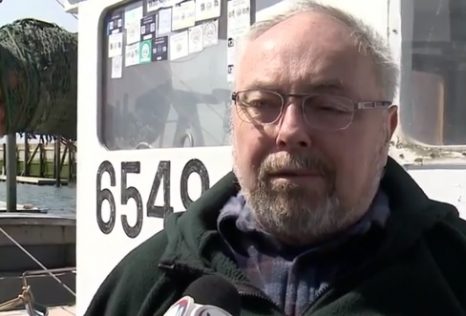
Fishermen hope for long-term solution to At-Sea Monitoring costs
The federal budget bill approved last month includes millions of dollars to pay for workers who are required to join fishing trips off New England’s shores. But it’s a temporary fix. And for the few groundfishermen left, the cost could be too much to take on themselves. David Goethel has been groundfishing off Hampton’s coast for 51 years and says a lot has changed. “We’ve lost in New Hampshire about 95 percent of our active fishermen in the last 17 years,”,, >click to read<11:24

Proposed Magnuson Stevens changes are reasonable – Support HR-200
“Things bad begun make strong themselves by ill” Macbeth,Act III, Scene II I am wondering how much commercial fishermen know about acting? At a guess I’d say probably as much, or as little, as most actors know about commercial fishing, even award winning ones. This thought arose following the recent appearance in these pages of an opinion piece>click to read Rep Keating, defend the Magnuson Act< on fishery management by a member of the acting profession in an attempt to wield political influence. The thespian in question is also an Ocean board member, a well funded environmental group antithetical to America’s oldest industry. By Don Cuddy, >click to read< 19:35
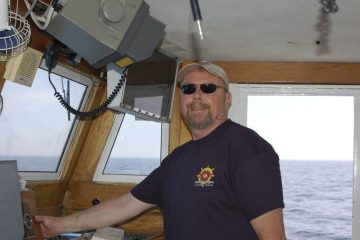
Fisherman who sued feds thrilled about funding for at-sea monitoring
A commercial fisherman who sued the federal government over at-sea monitoring costs was thrilled Thursday when it was announced the National Oceanic and Atmospheric Administration would fully fund the program under the omnibus government spending bill. David Goethel, of Hampton, said he learned about the funding Wednesday. “I’ve been sitting on this for 18 hours. I was like a cat that swallowed a canary. I didn’t want to spit out any feathers,” Goethel said Thursday afternoon. >click to read<09:01
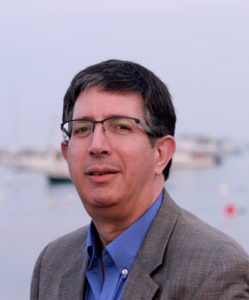
Hitting the Trail: NOAA’s GARFO leader looks to cultivate culture of collaboration
As debuts go, Mike Pentony’s first day on the job as the regional director for NOAA’s Greater Atlantic Regional Fisheries Office was a corker. The federal government marked his ascension on Jan. 22 as only the federal government can — shutting down all but the most essential government services as a consequence of the usual congressional mumbley-peg. “My first action was to come in and proceed with the orderly shutdown of government operations,” Pentony said recently during an interview in the corner office on the uppermost floor of GARFO headquarters in Gloucester’s Blackburn Industrial Park. The respite was short-lived. The shutdown lasted a day. >click to read< 23:52

Scare-mongering Big Brother on America’s fishing boats hurts those who know the industry best
The plague on the commercial fishing industry isn’t “overfishing,” as environmental extremists and government officials claim. The real threats to Northeastern groundfishermen are self-perpetuating bureaucrats, armed with outdated junk science, who’ve manufactured a crisis that endangers a way of life older than the colonies themselves. Hardworking crews and captains have the deepest stake in responsible fisheries management — it’s their past, present, and future — but federal paper-pushers monitor them ruthlessly like registered sex offenders. >click here to read<09:47

While setting New England fishery rules, John Bullard was an exception
He’s been called a Neanderthal and the most reviled man in the region’s fishing community. At a public meeting broadcast on national TV, a fisherman once accused him to his face of lying for a living. As the regional fisheries administrator of the National Oceanic and Atmospheric Administration, John Bullard has drawn ire from all sides — fishermen, environmentalists, and politicians alike. His decisions have been routinely controversial, and he has rarely minced words in defending them. click here to read the story 20:53
Groundfishermen: ‘It feels like we’re just forgotten’
 New Hampshire fishermen say temporary federal aid for at-sea monitor coverage is barely holding their industry afloat now that a court battle over the cost appears to have ended. The National Oceanic and Atmospheric Administration is currently covering 60 percent of the cost for third-party at-sea monitors to observe commercial groundfishermen’s compliance with federal regulations. That coverage is projected to end May 1, 2018,,, Jamie Hayward, a commercial fisherman out of Portsmouth, said it will be devastating for fishermen to go from paying 40 percent of those costs to the full bill when NOAA stops assisting.,, will be like we got hit by a bomb,” he said. click here to read the story 16:57
New Hampshire fishermen say temporary federal aid for at-sea monitor coverage is barely holding their industry afloat now that a court battle over the cost appears to have ended. The National Oceanic and Atmospheric Administration is currently covering 60 percent of the cost for third-party at-sea monitors to observe commercial groundfishermen’s compliance with federal regulations. That coverage is projected to end May 1, 2018,,, Jamie Hayward, a commercial fisherman out of Portsmouth, said it will be devastating for fishermen to go from paying 40 percent of those costs to the full bill when NOAA stops assisting.,, will be like we got hit by a bomb,” he said. click here to read the story 16:57
NOAA Fisheries rule should alarm taxpayers
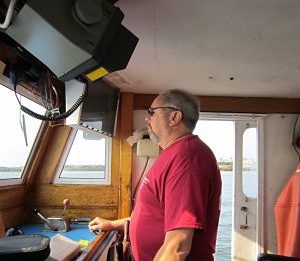 NOAA Fisheries has discovered a devious way to increase their budget without the checks and balances guaranteed by our forefathers, and the courts have let it stand. I have been involved in a lawsuit with NOAA Fisheries over who pays for at-sea monitors (ASM) for the last three years. These are basically our own personal state police men who ride along on the boat and watch and record everything fishermen do at sea. Fishermen have been forced to sign contracts with for-profit third-party companies that provide this service for $710 per day. Recently, the Supreme Court refused to hear our case, effectively ending our pursuit of justice. Readers should be concerned, not only because this job-killing regulation effects their ability to obtain local seafood, but also because the loss leaves in place a precedent that will allow regulatory agencies to tax citizens by passing regulations while bypassing Congress. click here to read the op-ed 08:56
NOAA Fisheries has discovered a devious way to increase their budget without the checks and balances guaranteed by our forefathers, and the courts have let it stand. I have been involved in a lawsuit with NOAA Fisheries over who pays for at-sea monitors (ASM) for the last three years. These are basically our own personal state police men who ride along on the boat and watch and record everything fishermen do at sea. Fishermen have been forced to sign contracts with for-profit third-party companies that provide this service for $710 per day. Recently, the Supreme Court refused to hear our case, effectively ending our pursuit of justice. Readers should be concerned, not only because this job-killing regulation effects their ability to obtain local seafood, but also because the loss leaves in place a precedent that will allow regulatory agencies to tax citizens by passing regulations while bypassing Congress. click here to read the op-ed 08:56
Groundfishermen: ‘It feels like we’re just forgotten’ – Fishermen who followed Goethel’s path through the federal courts said they were disappointed with the outcome. Goethel said he was “disillusioned” by the process. “Talk about feeling forgotten,” said Jamie Driscoll, a commercial fisherman from Kingston. “That’s how it feels. It feels like we’re just forgotten.” click here to read the op-ed
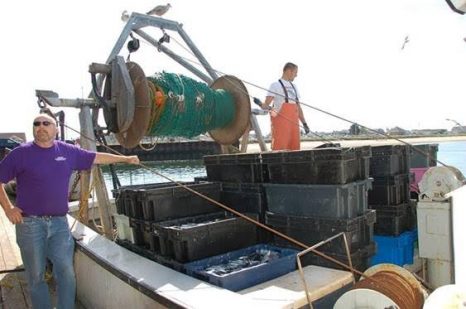
Why are fishermen guilty until proven innocent? A case against putting video cameras on every boat
As many of you may know, my husband filed a lawsuit against the National Marine Fisheries Service to stop them from requiring the fishermen to pay for the At-Sea monitors that the Fisheries Service requires ground fishermen to take on their boats. The cost is upwards of $700 a day, which is more than the small family owned fishing boats make here in New England. The Supreme Court decided not to hear their case which the lower courts had dismissed on a technicality because the suit was not filed within a 30 day time frame. Some people have suggested video monitoring as an alternative. I have addressed that in my comments below click here to read Ellen Goethels post 15:01
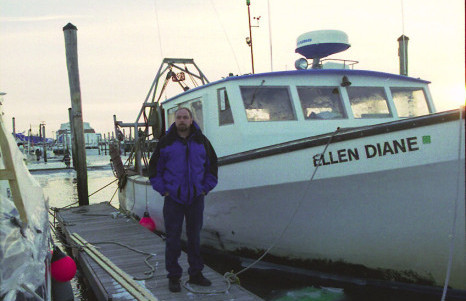
David Goethel – We have lost the case, but I have no intention of giving up the battle.
I wanted to express my heartfelt thanks to all the private citizens and members of fishing families who have called and emailed me about the recent Supreme Court decision. We have lost the case, but I have no intention of giving up the battle. Many of you have offered suggestions of how to proceed, and I will weigh them all carefully and take further action. In the meantime, I urge all of you, especially those not related to the fisheries, to pick up the phone and call either the Regional Office switchboard (978) 281-9250, or the switchboard at Silver Springs headquarters (301) 427-8000 and voice your displeasure with the current situation. I would also urge you all to contact your Federal Senators in your respective states and voice your frustration. Some members of Congress have tried to fix the problem but because it is regional, they are getting resistance from Senators outside New England. Since many of you come from all regions of the country your calls or emails would be particularly helpful. I wish to again, publicly thank Cause of Action. They have put tremendous time, money and expertise into this case. They are just as frustrated as all of you that no one would rule on the merits of our case. Finally, I want to remind everyone who reads this that citizens hold government accountable in a democracy. Sitting on the sidelines makes everyone assume you do not care. So please, pick up the phone or write that email, and let government know you are dissatisfied with this current outcome. Thank you, David Goethel 17:30
Gone fishin’: Court denies NH case – click here to read the op-ed

Supreme Court has declined to hear at-sea monitor case
The U.S. Supreme Court has denied a petition filed by a New England fishing group over the cost of at-sea monitors. New Hampshire cod fisherman David Goethel led the lawsuit. He says the cost shift adds hundreds of dollars to the daily cost of fishing and is driving people out of business. Attorneys for Goethel say on Monday that they’re disappointed the Supreme Court has declined to hear the case. They say they’ll look for new ways to challenge the cost shift, which they contend is unlawful. The suit named the U.S. Department of Commerce, which includes the National Oceanic and Atmospheric Administration. click here to read the story 12:58

Your View: Even ‘smart’ video monitoring is onerous to fishermen
I would like to make several observations regarding Michael Bonner’s Aug. 21 article, “Delegation supports Rafael’s forfeiture toward electronic monitoring.” First of all, state legislators’ support for utilizing the forfeiture to fund the electronic monitoring (surveillance), presupposes that this form of electronic monitoring will be supported and adopted. It surely does not seem to be the favored choice of monitoring, as far as the groundfish industry is concerned. In fact, they are not in favor of any form of monitoring that has been proposed to date. NOAA fisheries Regional Administrator John Bullard (soon to be retiring) is quoted as saying that he thinks that video monitoring is a major benefit to the industry. I’m not sure who he thinks he’s going to convince with that statement. Surely not the fishing industry. If that were the case, New Hampshire fisherman David Goethel likely would not be requesting that this “benefit” be reviewed by the U.S. Supreme Court, click here to read the op-ed by Jim Kendall 19:04
Deadline soon for feds’ response to fishing monitor petition
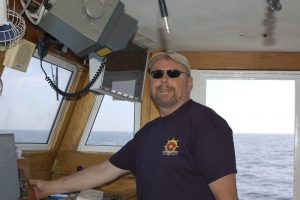 A fishermen’s group says it’s still waiting on the federal government’s response to a petition it filed with the U.S. Supreme Court about the cost of fishing monitors. The government shifted the cost of paying for monitors to fishermen last year, prompting a legal battle. A group of fishermen led by David Goethel of New Hampshire filed a petition seeking a review of the case last month. A spokesman for the fishermen’s attorney says the government has until Monday to respond and has not done so. link 15:32
A fishermen’s group says it’s still waiting on the federal government’s response to a petition it filed with the U.S. Supreme Court about the cost of fishing monitors. The government shifted the cost of paying for monitors to fishermen last year, prompting a legal battle. A group of fishermen led by David Goethel of New Hampshire filed a petition seeking a review of the case last month. A spokesman for the fishermen’s attorney says the government has until Monday to respond and has not done so. link 15:32

New Hampshire fleet dwindles as at-sea monitoring decision heads to Supreme Court
A New Hampshire fisherman leading the fight against a decision by the National Oceanic and Atmospheric Association to shift the cost of at-sea monitoring to industry has appealed the case to the U.S. Supreme Court. David Goethel of Hampton, New Hampshire, said he filed the appeal in early July. He is challenging the decision of a federal district court and the 1st U.S. Circuit Court of Appeals, which ruled in NOAA’s favor, according to the Associated Press. Goethal, who filed his original suit in December 2015, has been joined in his appeal by the Northeast Fishery Sector 13, which represents fishermen from Massachusetts to North Carolina. His legal support is being provided pro bono by the Cause for Action Institute.,, In Goethel’s appeal to the Supreme Court, he argues that NOAA’s requirement of at-sea monitors represents an illegal, warrantless search of private property, and that forcing the industry to pay for its own monitoring represents a violation of the Constitution’s Commerce Clause. click here to read the story 10:51
A fisherman’s tale of fighting Uncle Sam
We’re probably going well off the beaten path on this one, but I wanted to draw your attention to a lawsuit which has been percolating in the system since 2015 and may be coming to the Supreme Court later this year. It involves a small volume fisherman who is fighting back against onerous regulations from the Department of Commerce which are threatening to put him (and so many other family operations) out of business. David Goethel is in the fight of his life because new government regulations are costing him more per day than he can generally earn in profit from his fishing operation. Cause of Action Institute (CoAI) is working on this case and provides the details. click here to read the story 11:45






